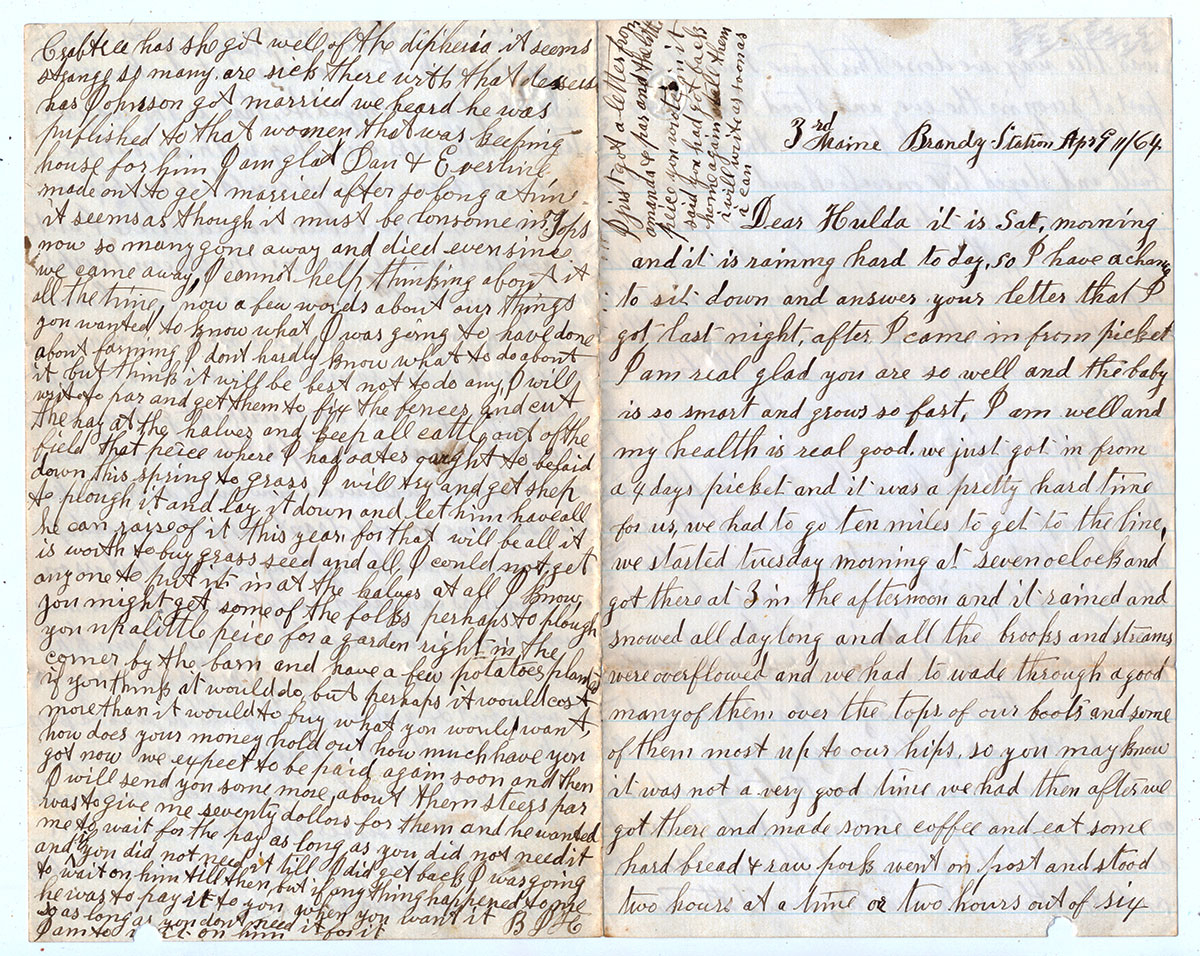site search
online catalog
UNION SOLDIER LETTER—PRIVATE BENJAMIN J. HALEY, 3RD MAINE INFANTRY

$95.00 SOLD
Quantity Available: None
Item Code: 1179-1694
Dated “3rd Maine Brandy Station April 9 1864.” Addressed to “Dear Hulda”. Four pages in ink, 5” x 8, on lined paper. Exhibits slight chip along lower margin. Else VG.
Text: “….I am real glad you are so well and the baby is so smart and grows so fast. I am well and my health is real good, we just got in from a 4 days picket and it was a pretty hard time for us, we had to go ten miles to get to the line…
We started tuesday morning at seven o’clock and got there at 3 in the afternoon and it rained and snowed all day long and all the brooks and streams were overflowed and we had to wade through a good many of them over the tops of our boots and some of them most up to our hips, so you may know it was not a very good time we had then after we got there and made some coffee and eat some hard bread & raw pork went on frost and stood two hour at a time or two hour out of six was the way we done this time
I went on post at seven in the eve and stood till nine and then I went back to where the fire was built and stayed till one oclock and then went on post again and stood till three then on against 7 in the morning, that is how we have to do on picket. Keep going on two hours and of 4 day and night till our 4 days was up, then it was a little harder this time than common for it rained all the time and it was a new picket line it was way down on the Rappahannock river we were on one side of the river and the Rebs on the other. The place where I stood on post was close to the bank of the river and the rebs had two gristmills over on the other side right opposite of me there was a house & over there a family living in it.
I could see them out and round the house in the day time all the time and see the men going back and forwards to the gristmill to work for they was grinding grain all the time the river was so narrow that we could write on a piece of paper question we asked them and do it up round a stone and throw it across onto the other side and they would throw answers back to us, and want to know what regt we belong to, that is th way we talk with the rebs and they with us, but we have not been where we could see any before this winter.
We have been moved since I last wrote to you last we are in the Second Corps we were in the 3rd before. We are nearer Brandy Station than we was we are in a low mudy place and it has rained so much for a fortnight that we can’t get out doors without getting into mud up to our boot tops. I don’t know how long we shall stay here where we are now but I don’t think we shall stay long for old Grant has got command of our army now, and hie is getting ready to start us on our summers campaign early he says there is enough men here to take Richmond and I think he will try it as soon as he can….’’
Born in New Brunswick, Canada, Benjamin J. Haley was a resident of Topsfield, ME when he enlisted as a private, mustering into the 3rd Maine Infantry 9/10/1863. On 6/28/1864 he transferred into the 17th Maine Infantry. Haley died of typhoid fever on 9/17/64 at Lincoln General Hospital in Washington, DC. He is buried in Pine Grove Cemetery in Topsfield.
At the writing of this letter his third Maine was preparing to embark on Grant’s 1864 Over land Campaign. Following Cold Harbor his new 17th Maine would engage in the Siege of Petersburg on through Gen. Lee’s surrender at Appomattox.
An excellent letter home from a soldier of the 3rd Maine on the eve of the Appomattox Campaign. In protective sleeve, accompanied by documentation. [jp/ld][ph:L]
~~~~~~~~~~~~~~~~~~~~~~~~~~~~~~~~~~~
THIS ITEM, AS WITH ALL OTHER ITEMS AVAILABLE ON OUR WEB SITE,
MAY BE PURCHASED THROUGH OUR LAYAWAY PROGRAM.
CLICK HERE FOR OUR POLICIES AND TERMS.
THANK YOU!
Inquire About UNION SOLDIER LETTER—PRIVATE BENJAMIN J. HALEY, 3RD MAINE INFANTRY
For inquiries, please email us at [email protected]
Most Popular
Historical Firearms Stolen From The National Civil War Museum In Harrisburg, Pa »
Theft From Gravesite Of Gen. John Reynolds »
Selection Of Unframed Prints By Don Troiani »
Fine Condition Brass Infantry Bugle Insignia »
British Imported, Confederate Used Bayonet »
Piece Of Wood From The Room In The White House Where Lincoln Signed The Emancipation Proclamation »
featured item
REGIMENTAL STANDARD OF MERRILL’S HORSE, 2ND MISSOURI CAVALRY
Formerly in the collections of the Texas Civil War Museum, this historic flag was carried by Merrill’s Horse, the 2nd Missouri Cavalry, raised under the authority of Gen. John C. Fremont, commanding the Western Department out of St. Louis. Fremont… (1179-031). Learn More »
site search
Upcoming Events
The shop will remain closed to the public through Friday, Jan. 31st, re-opening on Saturday, Feb.… Learn More »




